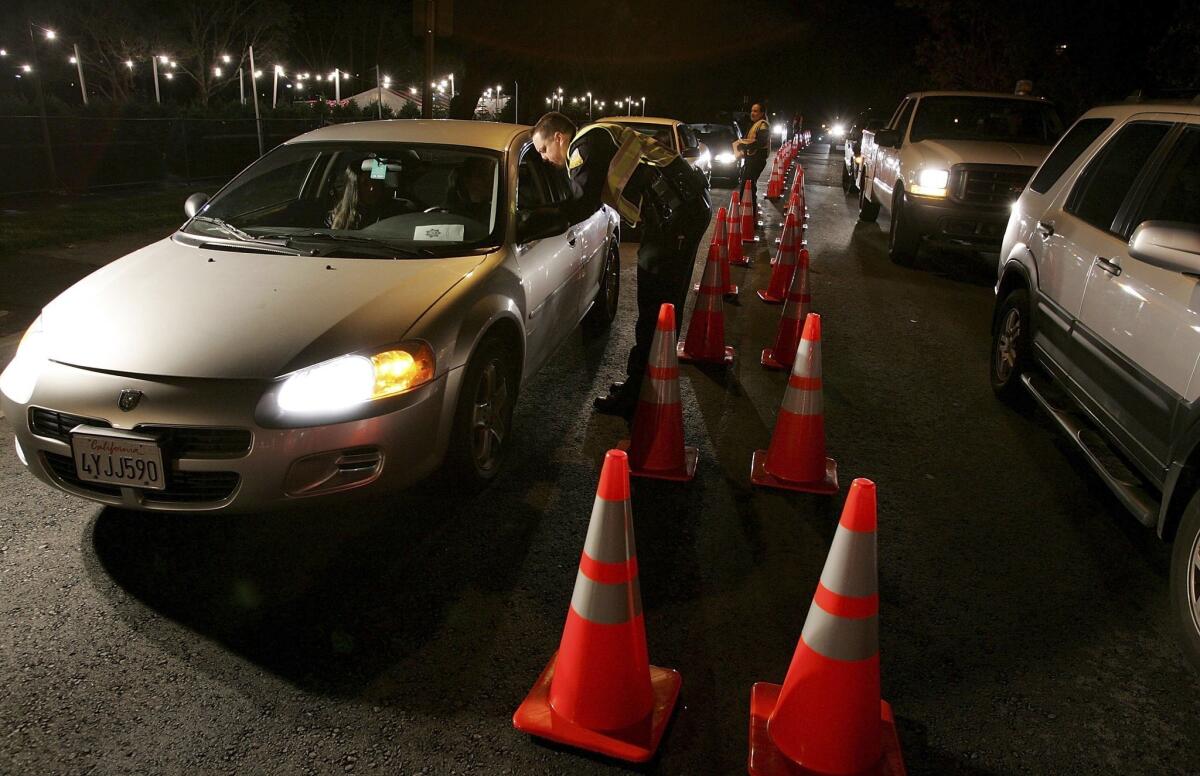Driving while high? Lawmakers want police to be able to check

San Bruno police officers stop cars at a DUI checkpoint. State officials are proposing a new test to determine when motorists are driving under the influence of marijuana and other drugs.
- Share via
Reporting from Sacramento — With medical marijuana in widespread use and a ballot measure planned to legalize recreational pot in California, state officials Tuesday proposed using new technology to catch the increasing number of motorists who are driving while high.
Legislation would allow law enforcement officers to use oral swab tests to strengthen cases when there is probable cause that a driver is impaired and the driver has failed sobriety field tests.
A hand-held electronic device would test for the presence of marijuana, cocaine, amphetamines and pain medications, including opiates, on the swab, according to Republican Sen. Bob Huff of San Dimas, who authored the bill.
“Sadly, we’ve become a nation of self-medicating, careless people,” Huff said. “The public is naïve in understanding how dangerous our roads are made by people who are abusing opiates, meth and cannabis.”
The legislative proposal is backed by the California Police Chiefs Assn. and California Narcotic Officers Assn. Supporters of SB 1462 cite a report by the National Highway Traffic Safety Administration that found a 22% increase in drugged driving arrests between 2007 and 2014.
California voters legalized medical use of marijuana in 1996. Between 2009-13, the number of drivers killed in crashes who tested positive for drugs increased by more than 40%.
After Colorado voters legalized recreational use in 2013, marijuana-related traffic deaths there increased 32% in one year, according to a report by the Rocky Mountain High Intensity Drug Trafficking Area enforcement initiative.
A bill similar to the one touted Tuesday stalled in committee last year after medical marijuana advocates opposed it.
The new proposal is “premature,” said to Dale Gieringer, director of the California branch of the National Organization for the Reform of Marijuana Laws.
Gieringer said the technology was not widely used by law enforcement.
“Oral swab testing is still an unproven technology,” Gieringer said. “Its accuracy has not been demonstrated in controlled, published scientific studies. There’s no evidence that oral swab testing results have any correlation to impaired driving.”
Test programs monitored by the federal government have been conducted around the country, including in Los Angeles, Fullerton and Kern County. The swab tests are used in place of more complicated blood and urine tests to detect drugs.
L.A. prosecutors found cases using the swab evidence are pleading out earlier than cases without it.
In what is believed to be the first successful prosecution using the test, a judge in Kern County admitted the swab results as evidence, according to Michael Yraceburn, a supervising deputy district attorney. If the Legislature acts to authorize use of the devices, it could lead to more widespread deployment, supporters said.
The bill also has the backing of Democratic Assemblyman Mike Gatto of Glendale, who underwent the test Tuesday in a demonstration at the Capitol that found him clean of drugs.
“Drugged driving is a serious problem that impacts every corner of our state,” Gatto said. “This legislation is not partisan. It’s simply the right thing to do to help save lives.”
Last year, the Legislature and Gov. Jerry Brown approved a new state bureau to license, regulate and tax those who grow, transport and sell medical marijuana. The bill also authorizes research by UC San Diego to lay the groundwork for new marijuana-specific field sobriety tests.
Assemblyman Tom Lackey (R-Palmdale), a former California Highway Patrol officer, said the research can help refine the practices of officers in the field and incorporate the use of oral swab devices.
Follow @mcgreevy99 on Twitter
ALSO
Capitol Journal: Longtime marijuana use might make you a loser
Portable drug test a new addition at New Year’s DUI checkpoints
How evolving public attitudes on marijuana could affect the 2016 presidential race
More to Read
Get the L.A. Times Politics newsletter
Deeply reported insights into legislation, politics and policy from Sacramento, Washington and beyond. In your inbox three times per week.
You may occasionally receive promotional content from the Los Angeles Times.









